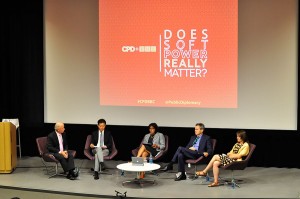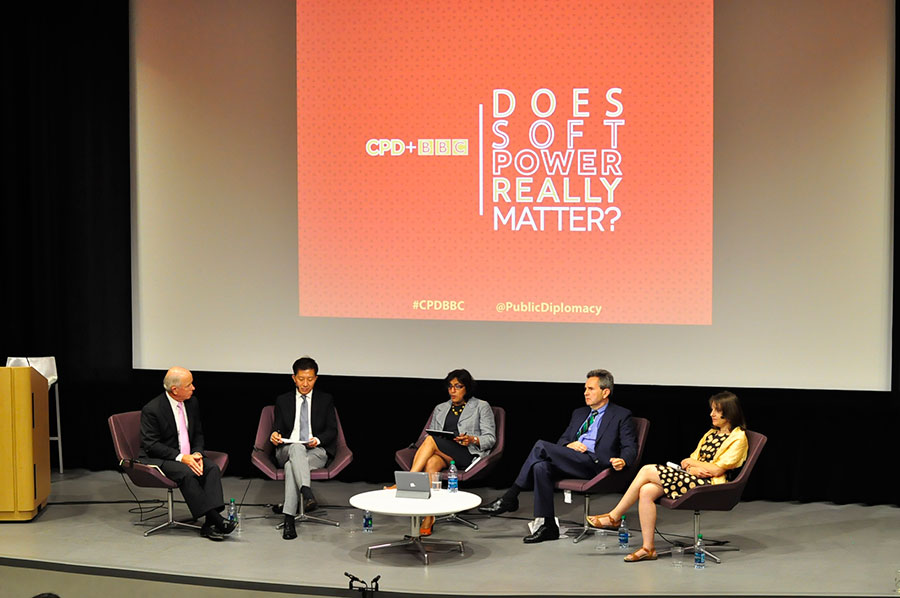Panelists discuss the role of soft power in diplomacy
The USC Center on Public Diplomacy held a discussion Thursday night in Wallis Annenberg Hall that focused on the use of soft power in world negotiations. The event, “Does Soft Power Really Matter?” was moderated by BBC host/presenter Ritula Shah as part of a larger series broadcast to both British and international viewers.

Soft power, hard choices · Panelists including Jay Wang, director of the USC Center on Public Diplomacy debated the role of soft power in international relations at a discussion on Thursday night. – Linda Hsu | Daily Trojan
The event featured a panel of experts in the fields of global studies and public diplomacy who assessed the significance of soft power in various facets of international relations.
The term “soft power” was coined by Joseph Nye, a political scientist and former dean of the John F. Kennedy School of Government at Harvard University.
“Soft power is the ability to get things you want through attraction rather than coercion or payment,” Nye said in a previously recorded interview with Shah that was played at the event.
Though globalization has made nation-states more interconnected than ever, recent events like Russia’s annexation of Crimea, territorial conflict in the South China Sea and enduring animosity in the Middle East serve as reminders that hostility — in the form of hard power — continues to impede diplomatic interactions on the modern world stage.
“Hard power and soft power are historical constants,” said Jay Wang, Director of the USC Center on Public Diplomacy. “What’s new is that in the contemporary times, because of the information environment that we’re living in, the powers are so diffused that there are so many different actors. In order to accomplish peaceful, productive relationships in the context of the global economy, we do rely more on soft power tools to establish that. Even though we are witnessing some hard power moments, in general soft power does matter — and matters more.”
Political scientist and professor of public policy at Pepperdine University Robert Kaufman, though, argued that this outlook is overreaching.
“Soft power has its place, but you have to make a reasonable distinction between dealing with democratic regimes in the democratic zone of peace, or regimes that are revolutionary, authoritarian and expansionist,” Kaufman said. “In the latter category, the Obama administration has vastly overrated the importance of soft power at the neglect of hard power.”
Yet P.J. Crowley, Global Communication Fellow at George Washington University, conceded that hard power is not everything.
“You can see today hard power also has its limits. We no longer, thankfully, fight wars to a total surrender. All wars now are wars of choice,” Crowley said. “You have the employment of hard power, but in determining who has the advantage or disadvantage, it’s accompanied by a significant campaign of soft power.”
Kaufman later asserted that soft power can be and has been beneficial, but only when the circumstances are convenient.
“The United States and weak countries, or countries not in the mainstream of geopolitics, have historically always advocated soft power because they’ve had the luxury to do it,” he said.
On this note, Shah cited the temperate relationships between Argentina and Brazil and among the United States and its bordering neighbors.
“Let me give you the contrast,” Kaufman said. “If Israel relied on soft power, it’d be gone in 30 minutes. The ability of a country to rely on soft power depends on your neighborhood, your enemies and the situation you’re in. Sometimes it works, and sometimes it’s a death sentence.”
Olga Oliker, associate director of the nonprofit global policy think tank RAND Corporation, cited the negative effects of soft power.
“Nothing Russia is doing now would have happened if it hadn’t started off with a very effective soft power campaign,” she said.
Technology fuels this negative soft power influence as well.
“Just because it’s soft doesn’t mean it’s nice,” Oliker said. “Soft power isn’t benevolent power; soft power is an effort to attract. ISIS uses soft power. This is where I think the Information Age is very important. They reach out to people around the world through the Internet, and that’s soft power.”
Students at the event said that the discussion highlighted a shift in the study of international relations.
“Soft power is the bright side of international relations, with a focus less on war, political maneuvering, or deceptive diplomacy but rather the power of cultural identity and ideals that either bind or separate countries and nations,” said Kenneth Lee, a freshman majoring in international relations (global economy). “Accordingly, globalization makes soft power critical.”
Others enjoyed the format of the event.
“I think the way this presentation was formatted was really cool because we got to see all these great thinkers discuss live instead of just reading a report or watching a program,” said Nimarta Singh, a sophomore majoring in international relations (global economy).

